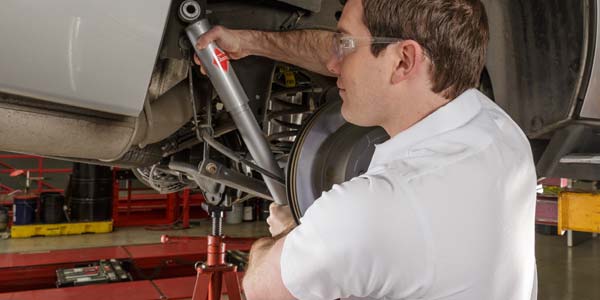Why Regular Suspension Checks are Crucial for Your Vehicle’s Health
Commonly known as your suspension system, the springs, shocks, and struts on your vehicle are constantly working to keep all four of your tires safely on the road. That contact helps with cornering, braking, and makes your ride more comfortable. Let’s look at how regular suspension checks can help your tires last longer, keep your car running smoothly, and save you money.
Understanding the Suspension System
Your vehicle’s suspension includes shock absorbers, springs, and struts found under your car or truck. Those parts move up and down thousands of times every mile to keep your tires on the road, even out dips and bumps, and keep you in control. That includes better cornering and braking.
Without that suspension system, you’d struggle around corners. Even a little speed bump would cause serious driving problems. While your overall suspension system can keep working great for years, parts of it will eventually need to be repaired or replaced.
The Role of Suspension in Vehicle Safety and Performance
Today’s suspension systems help enhance braking efficiency, make your ride more comfortable, and help keep you in control, whether you’re on a highway or back-country road. When your shocks, springs, or struts are not running at or near peak efficiency, safety and performance can be affected — sometimes dramatically. Additionally, lifting, lowering, or altering your vehicle can affect your suspension.
Before lowering your vehicle or adding overlanding equipment to your rig, check out our articles on the pros and cons of lowering your car or truck, and how overlanding can affect your suspension.
Common Suspension Issues: Signs & Impact
Knowing when your suspension parts need to be checked or serviced isn’t always easy. While modern suspension systems are protected as much as possible from road debris and dirt, minimizing their contact with the world also makes it hard to tell if they are ready for servicing. In fact, most shocks need to be physically leaking before it’s obvious they need to be replaced. Thankfully, there are some tell-tale signs that your suspension system might need attention.

Uneven Tire Wear
Suspension issues can cause tires to wear down faster than expected. This can include uneven wear and cupping along the edges of the tire.

Bumpy Ride
Do you feel every bump in the road? It could be time for a suspension check.

Loss of Control
Issues can include a delay in steering response, sluggishness around corners, and less-than-adequate braking (including your front end dropping dramatically when you press the brakes).

Sway in Turns
A rocking motion when cornering can indicate some serious suspension issues.

Leaning Vehicle
If your vehicle is leaning to one side or sits lower than you recall, get your suspension looked at.

The Importance of Regular Suspension Inspections
When you take care of your car or truck, including regular oil changes, filter replacements, and fluid level checks, your engine could last for a long time, saving you a lot of money in repair bills. The same can be said of your suspension components.
Regular inspections, repairs, and replacement of shocks, struts, and springs can help prevent major issues down the road, saving you money. Plus, those checks can help ensure a safe and comfortable ride, whether you spend most of your time commuting to work or going away for the weekend.
Do You Need a Suspension Inspection?
If you answer YES to any of the following, get to Les Schwab for a professional look at your suspension system.
-
Does the front end of your vehicle dive down when you brake?
-
Does your vehicle bounce excessively when you stop suddenly?
-
When you’re on rough roads, do you feel your car bounce or slide?
-
Does your vehicle bottom out over speed bumps?
Les Schwab’s Free Shock and Suspension Visual Check Service
Stop by your local Les Schwab for a free visual inspection of your vehicle’s suspension parts. If we cannot spot any issues or leaks, further testing may need to be done. If so, we’ll provide you with a complete cost estimate free of charge so that you can make an informed decision. Best of all, when you get your suspension fixed at Les Schwab, you’ll get a lifetime warranty on the parts and labor for as long as you own the vehicle.
What you need to know

Should I Get My Vehicle’s Suspension Checked?
Shocks and struts are key to your vehicle’s ride control. Find out why your vehicle’s suspension may need an inspection for a smoother and safer ride.

Lowering Suspension: Pros and Cons
Lowering your suspension is a popular customization that can improve driving performance and make your ride turn heads. Consider these factors first.

Shock and Strut Service and Repair FAQ
Get answers to your questions about shocks and struts. What do shocks and struts do? When do I need new shocks and struts?

